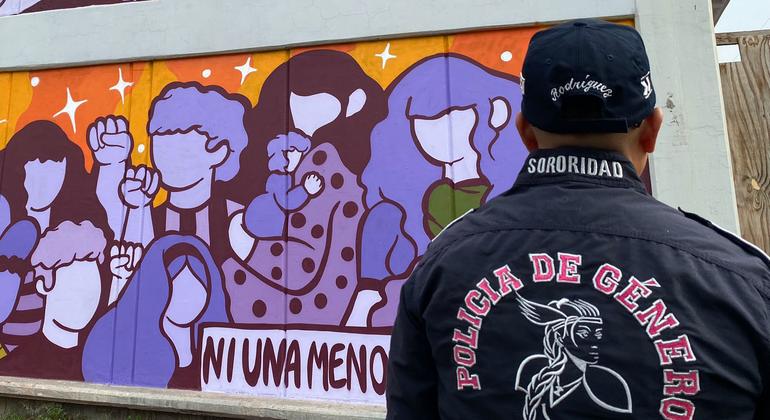Mexico: Organized crime boom makes femicide invisible, local activist says

Local activist Norma Andrade, who was recently at the United Nations Office in Geneva to raise awareness about the genocide of women, knows the issue firsthand. Her stepdaughter, Lilia Alejandra, was murdered in the same city in 2001.
“As my niece summed it up: we are worth a peanut – which in other words means women are disposable,” she said. UN News.
“One day she was working in a factory, the next day she disappeared, the next day she was found dead, while someone else had replaced her at work, So [her death] only important to her family – not to society, not to the government, not to the authorities or the company,” she explains.

Norma Andrade in front of the artwork “In Women’s Hands” by Clara Garesio at the Palais des Nations, Geneva.
Impunity is widespread
According to Ms. Andrade, the fact that Juárez is an important border crossing with the United States contributes to a lack of community cohesion, dehumanizes people and makes fighting against femicide more difficult.
But the problem is not limited to that. Across Mexico, every day about 10 women and girls are murdered by intimate partners or other family members, according to government data.
Since 2001 – the year Lilia Alejandra was murdered – 50,000 women have been murdered, while the impunity rate is more than 95%.
Furthermore, only 2% of cases end in a criminal conviction and only 1 in 10 victims dare report the aggressor.
There is no justice
Ms. Andrade has survived two murders in the 23 years since her daughter’s body was discovered, as she continues her quest for justice.
“In Mexico, the increasing number of disappearances is real, but the explosion of organized crime and drug trafficking has erased what is happening to women, not that it has stopped happening,” she said. But it’s becoming invisible…”.
Although violence against women is increasing, its visibility is decreasing – local activist Norma Andrade
Speaking about the lack of justice, she said that even if the remains of a missing young woman were found, it would still be an “achievement” because it brought closure to their family. “It gives them a place to go and mourn their daughter,” she added.
Since her daughter’s disappearance, Ms. Andrade has fought for justice.
“Recently, an expert made me see a reality I hadn’t seen in 23 years, a reality I didn’t want to accept: I probably wouldn’t find justice for Alejandra. Or at least the legal justice I hope for will not put Alejandra’s attackers in prison,” she emphasized.
Her case was transferred to the Inter-American Court of Human Rights, based in Costa Rica, in December 2023.
Symbolic justice
“Perhaps we can find moral or symbolic justice,” Ms. Andrade said, “because the moment the Mexican State imposes criminal sentences […] it openly admitted that it did not protect Alejandra, nor Alejandra’s entire family in the country, nor all the children who were orphaned when their mother was murdered; and that will alleviate legal injustice to some extent.”
Blaming a lack of political will, Ms. Andrade, who is also a co-founder of a nonprofit association of mothers whose daughters were victims of the femicide in Ciudad Juárez, added that women Mothers are the ones who “swim against the current”.
Supported by other women, academics, feminists and civil society activists, she said, they are the ones “who have to go, protest and speak up to be counted”.
In recent years, the crime has sparked waves of protests and put gender-based violence at the top of Mexico’s political agenda.
Hold on to the problem Feminicide getting attention, and making information available and accessible to women, is key to holding authorities accountable and preventing violence against women and girls.
Since 2011, UN Women, in partnership with key state institutions, has Periodic research is published Analyze the scope, trends, and characteristics of genocide in the country.

The Ecatepec mural “Voices of resistance: murals for justice and memory” honors all the mothers who fought for their daughters killed by genocidal violence.
‘Look at us’
Ms. Andrade stars in the documentary Norma, seek justice directed by French journalist Brigitte Leoni, screened in Geneva ahead of the International Day for the Elimination of Violence against Women on 25 November.
She hopes the documentary will provide a clearer look at missing persons cases, noting that “this explosion of organized crime has caused people to flee, to cross the border into the United States and the drug trade has made what is happening to women invisible.”
Speaking in Geneva, where the office of the United Nations High Commissioner for Human Rights is located (OHCHR), UN News asked Ms. Andrade what message she wanted to share with human rights experts.
“Look at us, look at the mothers. Come here to meet the families and don’t just cling to the image the government gives to the outside world,” she said.
Feminicide crosses borders
Violence against women is a global crisis, according to the reportUnited Nations Womenand the United Nations Office on Drugs and Crime (UNODC), released on International Day.

Women march on International Women’s Day in Mexico City.
The celebration marks the beginning of 16 Days of Activism Against Gender-Based Violencean annual campaign that runs until December 10, Human Rights Day.
Regional data shows that femicide transcends borders, socioeconomic status, and culture, but its severity varies.
Africa recorded the highest rate of murder of intimate partners and women related to families, with 21,700 women killed in 2023, followed by the Americas and Oceania.
In Europe, 64% of victims were murdered by their intimate partners; In the Americas, this rate is 58%.
In contrast, women in Africa and Asia are more likely to be killed by family members than by their intimate partners.
The report reveals that globally, 140 women and girls will die every day at the hands of their partners or relatives by 2023 – one woman every 10 minutes.




